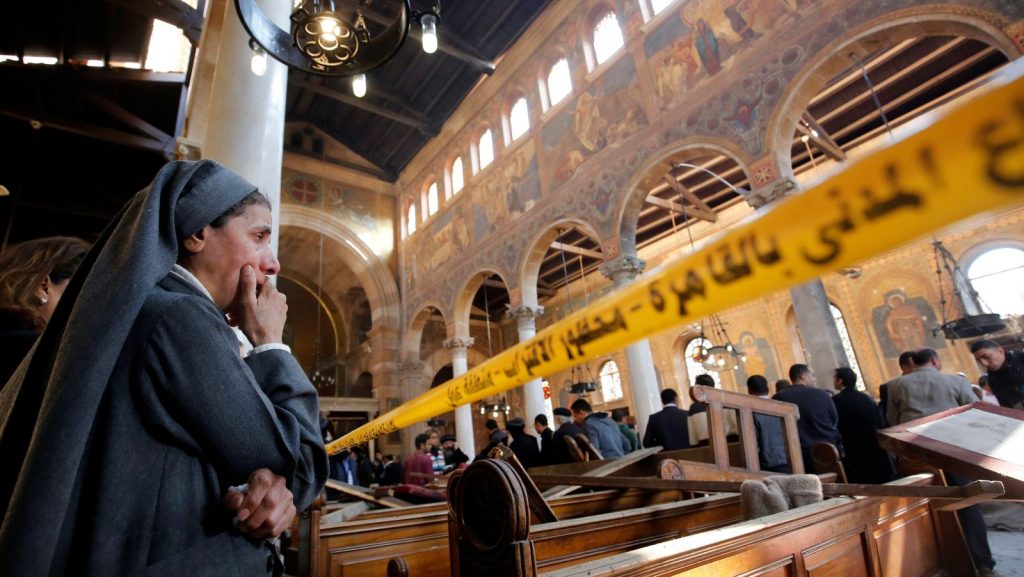Farid Y. Farid – Quartz Africa –

A nun cries as she stands at the scene inside Cairo’s Coptic cathedral, following the Dec. 11 bombing (Reuters/Amr Abdallah Dalsh)
Just over a week ago, terrorist group ISIS claimed responsibility for the attack on St Peter & St Paul’s church in Cairo where 27 people, mostly women, were killed and scores more injured.
Father Antonious Mounir, the parish priest who was leading the mass in prayers when the bomb ripped through the chapel adjoining the cathedral, told Quartz how he was lucky to remain alive.
I could have died but God granted me another life. There was shrapnel right next to me from the explosion that could have punctured my side.
Mounir has been visiting those wounded, including a 10 year old girl who eventually died on Tuesday (Dec.20). In June, ISIS killed a Coptic priest in the Sinai in broad daylight.
“The church is in the [St Marks] cathedral complex signaling the vivid symbolism of the explosion,” says Ishak Ibrahim, a religious freedoms researcher at the Egyptian Initiative for Personal Rights. “It aims at terrorizing the heart of Coptic Orthodoxy in Egypt”.
The terrorist group vowed further attacks and declared ‘a war against polytheism’ referring to the Christians’ belief in the trinity pejoratively in a statement.
This particular attack fits in with the pattern of ISIS’s notorious aim to shock and awe, hitting a minority religion and at women. It also shows the difficult position Coptic Christians find themselves in Egypt today, as the largest religious minority in the Middle East at around 10 million people. On the one hand an easy target for a callous terror group. But on the other, living as a second class group in their own country, under a different kind of threat from the authorities.
Mounir says what Copts have repeated for centuries,
We don’t have any hatred in our hearts or any ill feeling towards those who did such horrible things. We are used to having martyrs throughout our history.
The Coptic calendar starts from 284 AD when the Roman emperor Diocletian butchered the early Christians in Egypt and thus cementing the powerful mythology of martyrdom in the annals of the Alexandria based church. It is a deep and pervasive state that many Copts have clung to, especially by their clergy, in order to rationalize the state’s negligence and impunity for regular violent sectarian attacks.
The martyrdom narrative becomes a cipher to understanding the mounting calamities in the absence of the authorities’ political intransigence when it comes to protecting its citizens.
When national fury erupted over an old Coptic woman stripped naked and degraded by a Muslim mob in a small village this year, offenders were let go by the authorities and president Abdel Fattah El Sisi half-heartedly asked her not to feel too incensed by the incident.
Even with the latest church attack, Sisi bafflingly said that ‘it wasn’t a failure in lax security rather a blow against the terrorists’. Yet, this was one of 45 incidents of violence targeting Copts from forced evictions to torching of their homes this year.
Most incidents go unpunished, filtered through ‘reconciliation sessions’ under the auspices of the government that aim to move past the violence in order not to inflame the sectarian climate. This tired exercise become couched in worn out patriotic discourses and securitized language sidestepping the root issues of endemic institutional discrimination by the state against Copts in public life.
Outside of the funeral, protestors clashed with the police revealing the fissures of Coptic support for Sisi who had promised more security with his presidency. “The gulf between the authorities’ political rhetoric which on the whole is positive and actions on the ground to secure Copts’ safety is sorely missing” Ibrahim added.
But he also cautioned that this is not enough to break their overall faith in the state. Copts look to the vanishing minorities in Syria and Iraq with weariness of their fate.
For Mounir, the priest, he urged for a restrained response saying
I would tell them (ISIS) to think and read.
_______________
Egypt’s Coptic Christians are stuck between between ISIS and an indifferent government




